人教版高中英语必修三Unit1 Festivals around the world Grammar课件(共24张PPT)
文档属性
| 名称 | 人教版高中英语必修三Unit1 Festivals around the world Grammar课件(共24张PPT) | 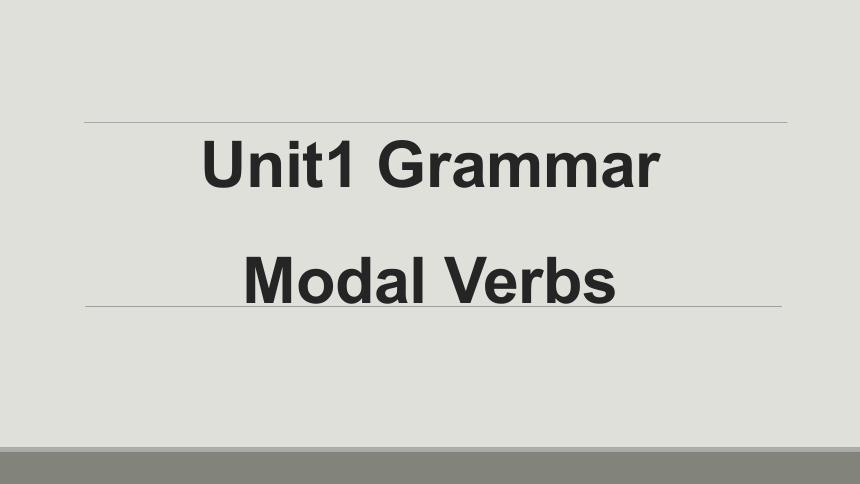 | |
| 格式 | zip | ||
| 文件大小 | 15.7MB | ||
| 资源类型 | 教案 | ||
| 版本资源 | 人教版(新课程标准) | ||
| 科目 | 英语 | ||
| 更新时间 | 2020-03-23 10:55:27 | ||
图片预览

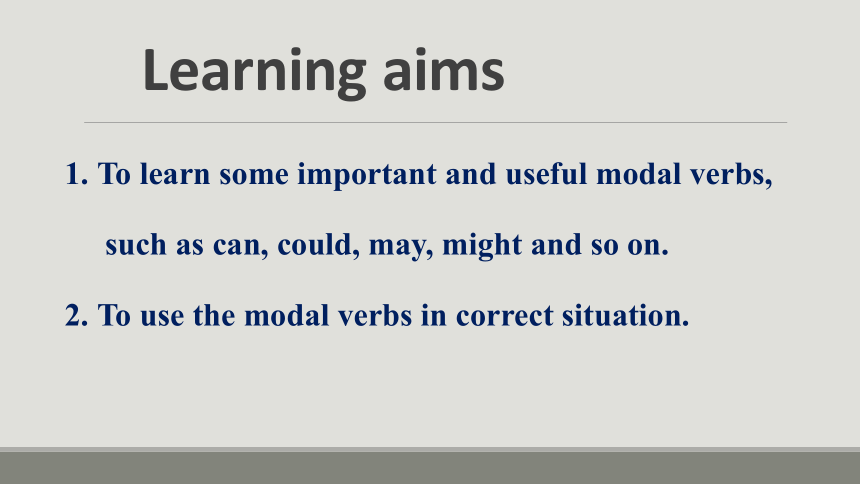
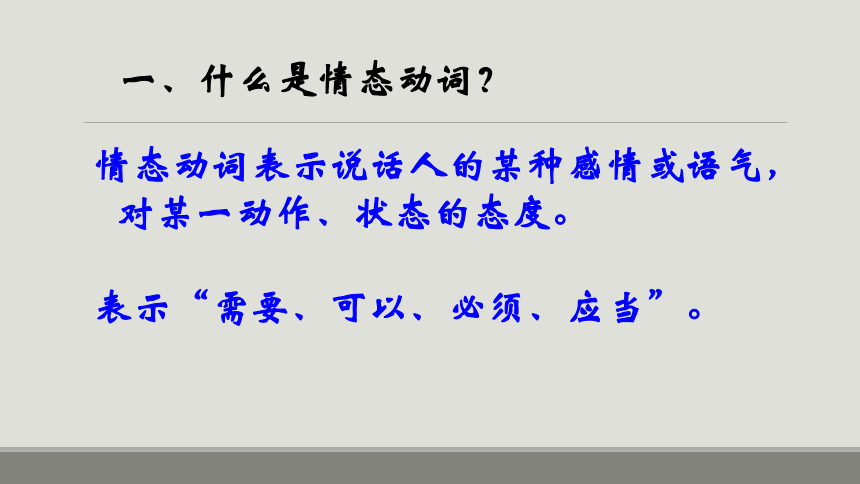
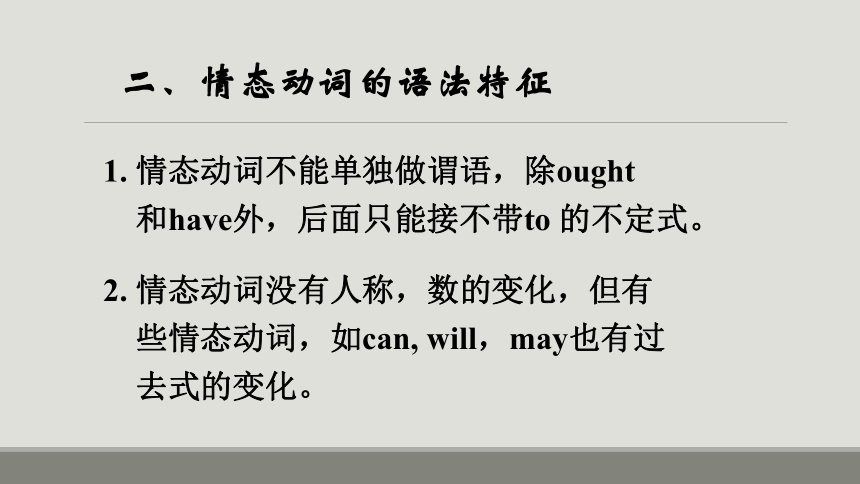
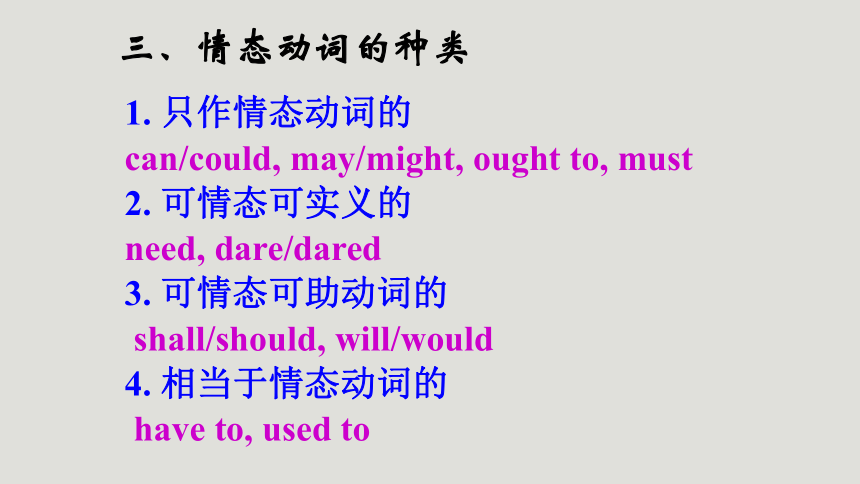
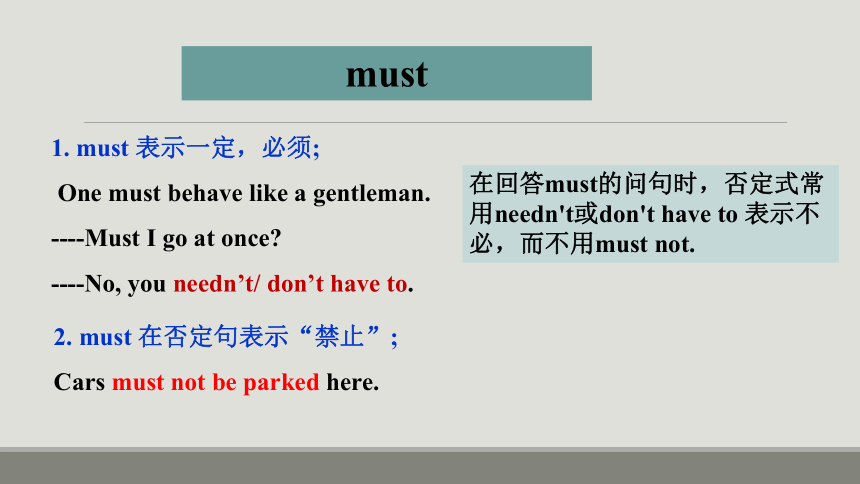
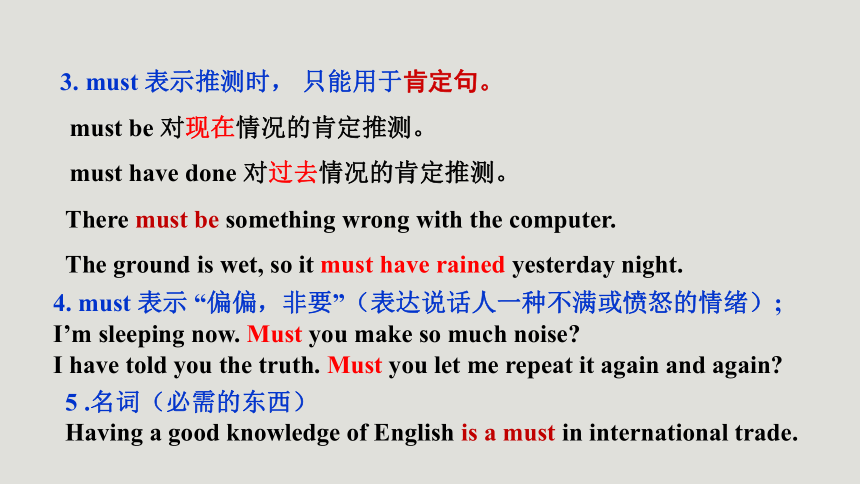

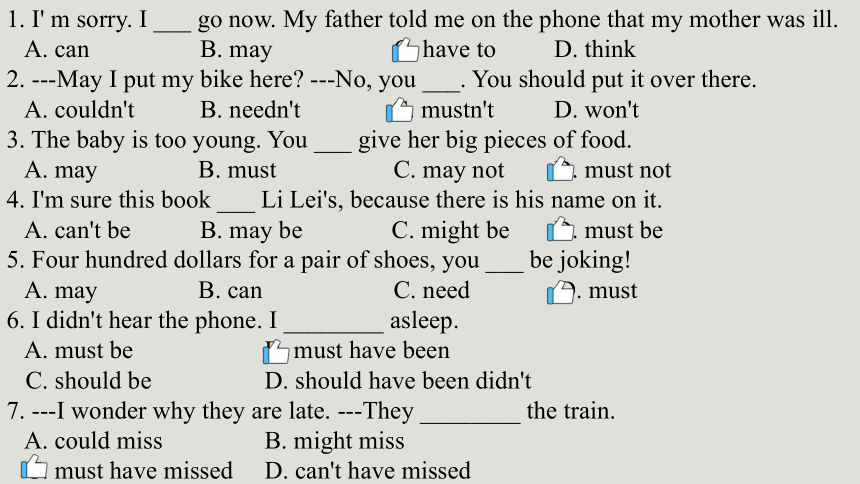
文档简介
(共24张PPT)
Unit1 Grammar
Modal Verbs
Learning aims
1. To learn some important and useful modal verbs,
such as can, could, may, might and so on.
2. To use the modal verbs in correct situation.
情态动词表示说话人的某种感情或语气,对某一动作、状态的态度。
表示“需要、可以、必须、应当”。
一、什么是情态动词?
二、情态动词的语法特征
1. 情态动词不能单独做谓语,除ought
和have外,后面只能接不带to?的不定式。
2. 情态动词没有人称,数的变化,但有
些情态动词,如can, will,may也有过
去式的变化。
1. 只作情态动词的
can/could, may/might, ought to, must
2. 可情态可实义的
need, dare/dared
3. 可情态可助动词的
shall/should, will/would
4. 相当于情态动词的
have to, used to
三、情态动词的种类
must
1. must 表示一定,必须;
One must behave like a gentleman.
----Must I go at once?
----No, you needn’t/ don’t have to.
在回答must的问句时,否定式常用needn't或don't have to 表示不必,而不用must not.
2. must 在否定句表示“禁止”;
Cars must not be parked here.
3. must 表示推测时, 只能用于肯定句。
must be 对现在情况的肯定推测。
must have done 对过去情况的肯定推测。
There must be something wrong with the computer.
The ground is wet, so it must have rained yesterday night.
4. must 表示 “偏偏,非要”(表达说话人一种不满或愤怒的情绪);
I’m sleeping now. Must you make so much noise?
I have told you the truth. Must you let me repeat it again and again?
5 .名词(必需的东西)
Having a good knowledge of English is a must in international trade.
区别:
must 只有现在时
have to 可用在现在时,过去时,将来时
must 表示主观看法
have to 表示客观需要
I don't like this radio. I must buy a new one.
The radio is broken. I have to buy a new one.
must VS have to
1. I' m sorry. I ___ go now. My father told me on the phone that my mother was ill.
A. can B. may C. have to D. think
2. ---May I put my bike here? ---No, you ___. You should put it over there.
A. couldn't B. needn't C. mustn't D. won't
3. The baby is too young. You ___ give her big pieces of food.
A. may B. must C. may not D. must not
4. I'm sure this book ___ Li Lei's, because there is his name on it.
A. can't be B. may be C. might be D. must be
5. Four hundred dollars for a pair of shoes, you ___ be joking!
A. may B. can C. need D. must
6. I didn't hear the phone. I ________ asleep.
A. must be B. must have been
C. should be D. should have been didn't
7. ---I wonder why they are late. ---They ________ the train.
A. could miss B. might miss
C. must have missed D. can't have missed
1. 表示能力(自身所具有的能力):
?The lecture hall can seat 1000 people.
2. 表示请求或允许:
Can I sit here?
3. 表示推测, 用在否定句,“不可能”
can't be 对现在情况的否定推测。
can't /couldn't have done 对过去情况的否定推测
He can’t be at home, for the house is dark.
It can't /couldn't have rained yesterday night because the ground is dry.
can
4. 在肯定句中,理论上的可能性
Everyone can make mistakes in his life.
Accidents can happen at any time.
can VS could主要用法:
1. could 是can的过去式,
We all knew that the young man couldn’t be a doctor.
2. could可代替can表示请求, 语气较委婉:
I would appreciate it if you could….
can
be able to
can
be able to
有一般现在时和一般过去时(could)
各种时态
I’ll not be able to come this afternoon.
can VS be able to
1.
自身具有的能力
经过努力才得以做成功某事
2.
He was able to go to the party yesterday evening in spite of the heavy rain.
The fire spread through the hotel very quickly but everyone was able to get out.
1. We hope that as many people as possible ___ join us for the charity show tomorrow.
A. need B. can C. must D. should
2. ---___ your friend play the guitar?
---Yes, he can, but he can't play it well.
A. Must B. Can C. Should D. Need
3. Tony ___ go to the opera on Saturday because he's going to have a meeting.
A. can’t B. might C. mustn’t D. should
4. ---Listen! Is Professor Bloom giving a speech in class?
---No, it ___ be him. He has gone to France.
A. may not B. mustn’t C. needn’t D. can’t
5. ---Who’s that boy reading in the garden? Is that David?
---It ___ be David. I saw him in the classroom just now.
A. must B. can’t C. may D. shouldn’t
6. My sister met him at the Grant Theatre yesterday afternoon, so he ________ your lecture.
A. couldn't have attended B. needn't have attended
C. mustn't have attended D. shouldn't have attended
1. shall用于第一、三人称疑问句,表示征求对方意见或请求
What shall we do this evening?
Shall I/he wait for you outside?
2. shall 用于第二、三人称肯定句,表示命令,警告,威胁,允诺
You shall fall behind in your exam if you keep playing.
The interest shall be divided into five parts, according to the agreement
made by both sides.
3. shall用于第三人称,表示法律条文、规章制度的规定。
No reader shall remove a book from the library without the
permission of the librarian.
shall VS should
3. should 表示义务、建议,意为 “应该”。
You should keep your promise.
He suggested that we (should) come early.
4. 表示惊讶,不满,“竟然”
It never occurred to me that she should lie to me again.
5. 表示推测“照说应该”.
He should be 20 years old.
1.--- The room is so dirty. ______ we clean it?
---- Ok.
A. will B. Shall C. Would D. Do
2. “The interest(利息) __ be divided into five parts, according to
the agreement,” declared the judge.
A. may B. should C. must D. shall
3. You can’t imagine that a well-behaved gentleman ___ be so rude to a lady.
A. might B. need C. should D. would
4. It’s nearly seven o’clock. Jack __ be here at any moment.
A. must B. need C. should D. can
1. 表示请求、允许:
May I come in ? You may go now.
2. 表示推测,“可能”
may be 对现在情况的推测。
may have done 对过去情况的推测。
◆--- I believe the man is from England.
---But I may be wrong.
◆She may /might have read it in the papers.
3. 表示祝愿
May you succeed!
May you have a good journey!
may 和 might
在回答may的问句时,肯定式常用may/can;否定式常用mustn't/can't.
1. ---Is Mr. Brown driving here?
---I’m not sure. He ____ come by train.
A. may B. shall C. need D. must
2. ---Tom, don’t drive too fast, you ___ hit the others’ cars.
---Ok, I won’t, Mum.
A. must B. need C. may D. have to
3. ---Will you answer the telephone? It ___ be your mother.
---Sorry. I ____. I’m busy.
A. can; mustn’t B. may; won’t
C. may; can’t D. need; will
4. He?______you?more?help, even?though?he?was?busy.?
A.?might?have?given?????? B.?might?not?give????
C.?may?not?have?given????? D.?may?give?
1. 用于表示“意志”“决心”
I will offer you any information you need.
2. 表示“请求”
Will you accept my invitation?
3. 表示“总是,习惯于”
He will take a walk in the park every day.
will 和 would
4. would与used to 区别
He used to live in the country, but now he lives in the city.
He would take a walk after supper when he was young.
used to表示过去的事情,现在不做
would 过去的习惯动作,与现在无关
1.作为情态动词用,常用在否定句和疑问句中。
dare (need) do sth.
daren’t (needn’t) do sth.
e.g.: I daren’t walk through the forest at night.
Dare you walk through the forest at night?
可做实义动词的情态动词:need, dare
2. 作实义动词用,常用在肯定句中, 有人称、时态、和数的变化:
在肯定句中,dare/need to do
在疑问句和否定句中,dare/need (to) do
I dare to swim across this river.
He doesn’t dare (to )answer.
He will dare any danger.
3. need( want, request)+ doing/ to be done
e.g.: The house needs cleaning/ to be cleaned.
主动形式表被动
could have done
ought to/should have done
needn’t have done
may/might have done
情态动词+have done:表示虚拟
本可以做(而未做)…
本该做却没做(而未做)…
本不必做却做了(却做了)…
可能已经做了(却未做)…
Unit1 Grammar
Modal Verbs
Learning aims
1. To learn some important and useful modal verbs,
such as can, could, may, might and so on.
2. To use the modal verbs in correct situation.
情态动词表示说话人的某种感情或语气,对某一动作、状态的态度。
表示“需要、可以、必须、应当”。
一、什么是情态动词?
二、情态动词的语法特征
1. 情态动词不能单独做谓语,除ought
和have外,后面只能接不带to?的不定式。
2. 情态动词没有人称,数的变化,但有
些情态动词,如can, will,may也有过
去式的变化。
1. 只作情态动词的
can/could, may/might, ought to, must
2. 可情态可实义的
need, dare/dared
3. 可情态可助动词的
shall/should, will/would
4. 相当于情态动词的
have to, used to
三、情态动词的种类
must
1. must 表示一定,必须;
One must behave like a gentleman.
----Must I go at once?
----No, you needn’t/ don’t have to.
在回答must的问句时,否定式常用needn't或don't have to 表示不必,而不用must not.
2. must 在否定句表示“禁止”;
Cars must not be parked here.
3. must 表示推测时, 只能用于肯定句。
must be 对现在情况的肯定推测。
must have done 对过去情况的肯定推测。
There must be something wrong with the computer.
The ground is wet, so it must have rained yesterday night.
4. must 表示 “偏偏,非要”(表达说话人一种不满或愤怒的情绪);
I’m sleeping now. Must you make so much noise?
I have told you the truth. Must you let me repeat it again and again?
5 .名词(必需的东西)
Having a good knowledge of English is a must in international trade.
区别:
must 只有现在时
have to 可用在现在时,过去时,将来时
must 表示主观看法
have to 表示客观需要
I don't like this radio. I must buy a new one.
The radio is broken. I have to buy a new one.
must VS have to
1. I' m sorry. I ___ go now. My father told me on the phone that my mother was ill.
A. can B. may C. have to D. think
2. ---May I put my bike here? ---No, you ___. You should put it over there.
A. couldn't B. needn't C. mustn't D. won't
3. The baby is too young. You ___ give her big pieces of food.
A. may B. must C. may not D. must not
4. I'm sure this book ___ Li Lei's, because there is his name on it.
A. can't be B. may be C. might be D. must be
5. Four hundred dollars for a pair of shoes, you ___ be joking!
A. may B. can C. need D. must
6. I didn't hear the phone. I ________ asleep.
A. must be B. must have been
C. should be D. should have been didn't
7. ---I wonder why they are late. ---They ________ the train.
A. could miss B. might miss
C. must have missed D. can't have missed
1. 表示能力(自身所具有的能力):
?The lecture hall can seat 1000 people.
2. 表示请求或允许:
Can I sit here?
3. 表示推测, 用在否定句,“不可能”
can't be 对现在情况的否定推测。
can't /couldn't have done 对过去情况的否定推测
He can’t be at home, for the house is dark.
It can't /couldn't have rained yesterday night because the ground is dry.
can
4. 在肯定句中,理论上的可能性
Everyone can make mistakes in his life.
Accidents can happen at any time.
can VS could主要用法:
1. could 是can的过去式,
We all knew that the young man couldn’t be a doctor.
2. could可代替can表示请求, 语气较委婉:
I would appreciate it if you could….
can
be able to
can
be able to
有一般现在时和一般过去时(could)
各种时态
I’ll not be able to come this afternoon.
can VS be able to
1.
自身具有的能力
经过努力才得以做成功某事
2.
He was able to go to the party yesterday evening in spite of the heavy rain.
The fire spread through the hotel very quickly but everyone was able to get out.
1. We hope that as many people as possible ___ join us for the charity show tomorrow.
A. need B. can C. must D. should
2. ---___ your friend play the guitar?
---Yes, he can, but he can't play it well.
A. Must B. Can C. Should D. Need
3. Tony ___ go to the opera on Saturday because he's going to have a meeting.
A. can’t B. might C. mustn’t D. should
4. ---Listen! Is Professor Bloom giving a speech in class?
---No, it ___ be him. He has gone to France.
A. may not B. mustn’t C. needn’t D. can’t
5. ---Who’s that boy reading in the garden? Is that David?
---It ___ be David. I saw him in the classroom just now.
A. must B. can’t C. may D. shouldn’t
6. My sister met him at the Grant Theatre yesterday afternoon, so he ________ your lecture.
A. couldn't have attended B. needn't have attended
C. mustn't have attended D. shouldn't have attended
1. shall用于第一、三人称疑问句,表示征求对方意见或请求
What shall we do this evening?
Shall I/he wait for you outside?
2. shall 用于第二、三人称肯定句,表示命令,警告,威胁,允诺
You shall fall behind in your exam if you keep playing.
The interest shall be divided into five parts, according to the agreement
made by both sides.
3. shall用于第三人称,表示法律条文、规章制度的规定。
No reader shall remove a book from the library without the
permission of the librarian.
shall VS should
3. should 表示义务、建议,意为 “应该”。
You should keep your promise.
He suggested that we (should) come early.
4. 表示惊讶,不满,“竟然”
It never occurred to me that she should lie to me again.
5. 表示推测“照说应该”.
He should be 20 years old.
1.--- The room is so dirty. ______ we clean it?
---- Ok.
A. will B. Shall C. Would D. Do
2. “The interest(利息) __ be divided into five parts, according to
the agreement,” declared the judge.
A. may B. should C. must D. shall
3. You can’t imagine that a well-behaved gentleman ___ be so rude to a lady.
A. might B. need C. should D. would
4. It’s nearly seven o’clock. Jack __ be here at any moment.
A. must B. need C. should D. can
1. 表示请求、允许:
May I come in ? You may go now.
2. 表示推测,“可能”
may be 对现在情况的推测。
may have done 对过去情况的推测。
◆--- I believe the man is from England.
---But I may be wrong.
◆She may /might have read it in the papers.
3. 表示祝愿
May you succeed!
May you have a good journey!
may 和 might
在回答may的问句时,肯定式常用may/can;否定式常用mustn't/can't.
1. ---Is Mr. Brown driving here?
---I’m not sure. He ____ come by train.
A. may B. shall C. need D. must
2. ---Tom, don’t drive too fast, you ___ hit the others’ cars.
---Ok, I won’t, Mum.
A. must B. need C. may D. have to
3. ---Will you answer the telephone? It ___ be your mother.
---Sorry. I ____. I’m busy.
A. can; mustn’t B. may; won’t
C. may; can’t D. need; will
4. He?______you?more?help, even?though?he?was?busy.?
A.?might?have?given?????? B.?might?not?give????
C.?may?not?have?given????? D.?may?give?
1. 用于表示“意志”“决心”
I will offer you any information you need.
2. 表示“请求”
Will you accept my invitation?
3. 表示“总是,习惯于”
He will take a walk in the park every day.
will 和 would
4. would与used to 区别
He used to live in the country, but now he lives in the city.
He would take a walk after supper when he was young.
used to表示过去的事情,现在不做
would 过去的习惯动作,与现在无关
1.作为情态动词用,常用在否定句和疑问句中。
dare (need) do sth.
daren’t (needn’t) do sth.
e.g.: I daren’t walk through the forest at night.
Dare you walk through the forest at night?
可做实义动词的情态动词:need, dare
2. 作实义动词用,常用在肯定句中, 有人称、时态、和数的变化:
在肯定句中,dare/need to do
在疑问句和否定句中,dare/need (to) do
I dare to swim across this river.
He doesn’t dare (to )answer.
He will dare any danger.
3. need( want, request)+ doing/ to be done
e.g.: The house needs cleaning/ to be cleaned.
主动形式表被动
could have done
ought to/should have done
needn’t have done
may/might have done
情态动词+have done:表示虚拟
本可以做(而未做)…
本该做却没做(而未做)…
本不必做却做了(却做了)…
可能已经做了(却未做)…
同课章节目录
